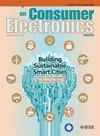消费类电子产品在车载边缘计算中的多层卸载优化策略
IF 4.3
2区 计算机科学
Q1 ENGINEERING, ELECTRICAL & ELECTRONIC
引用次数: 0
摘要
在消费电子领域,车辆边缘计算(VEC)技术正在成为汽车网络中一种新的数据处理范式。通过将与车辆应用相关的任务发送到边缘,该模型使计算能力更容易分散。这使得交互式服务能够快速响应。然而,边缘服务器上的计算资源本质上是有限的,并且经常需要处理多个并发操作。这些资源的无效分配严重损害了任务卸载的效率。此外,不加区分地卸载可能会使服务器不堪重负,对后续任务的性能产生不利影响。为了规避这些挑战,本研究引入了基于博弈论原理的多层卸载模型。该框架旨在优化边缘的资源利用率,同时考虑服务器负载,以确保及时执行对延迟敏感的任务。为了评估这一模型,本文专门为消费电子产品中的视频游戏任务创建了一个仿真环境。实验结果表明,多层卸载模型可以有效缓解边缘服务器的负载压力。多层卸载模型的任务失败率与几种最先进的算法相比保持在最低水平,显著降低了任务的执行延迟,能够满足消费电子应用的要求。本文章由计算机程序翻译,如有差异,请以英文原文为准。
A Multi-Tier Offloading Optimization Strategy for Consumer Electronics in Vehicular Edge Computing
In the domain of consumer electronics, vehicular edge computing (VEC) technology is emerging as a novel data processing paradigm within vehicular networks. By sending tasks related to vehicular applications to the edge, this model makes it easier for computing power to be spread out. This lets interactive services respond quickly. Nevertheless, the computational resources at edge servers are inherently limited and often tasked with handling multiple concurrent operations. The inefficacious allocation of these resources significantly impairs the efficiency of task offloading. Additionally, indiscriminate offloading could overwhelm the servers, detrimentally impacting the performance of subsequent tasks. To circumvent these challenges, this study introduces a multi-tier offloading model predicated on game theory principles. This framework aims to optimize resource utilization at the edge while accounting for server load to ensure the timely execution of latency-sensitive tasks. To evaluate this model, this paper created a simulation environment specifically for video game tasks in consumer electronics. The experimental results show that the multi-tier offloading model can effectively relieve the load pressure on the edge server. The task failure rate of the multi-tier offloading model remains at the lowest level compared with several state-of-the-art algorithms, significantly reducing the execution delay of tasks and being able to meet the requirements of consumer electronics applications.
求助全文
通过发布文献求助,成功后即可免费获取论文全文。
去求助
来源期刊
CiteScore
7.70
自引率
9.30%
发文量
59
审稿时长
3.3 months
期刊介绍:
The main focus for the IEEE Transactions on Consumer Electronics is the engineering and research aspects of the theory, design, construction, manufacture or end use of mass market electronics, systems, software and services for consumers.

 求助内容:
求助内容: 应助结果提醒方式:
应助结果提醒方式:


